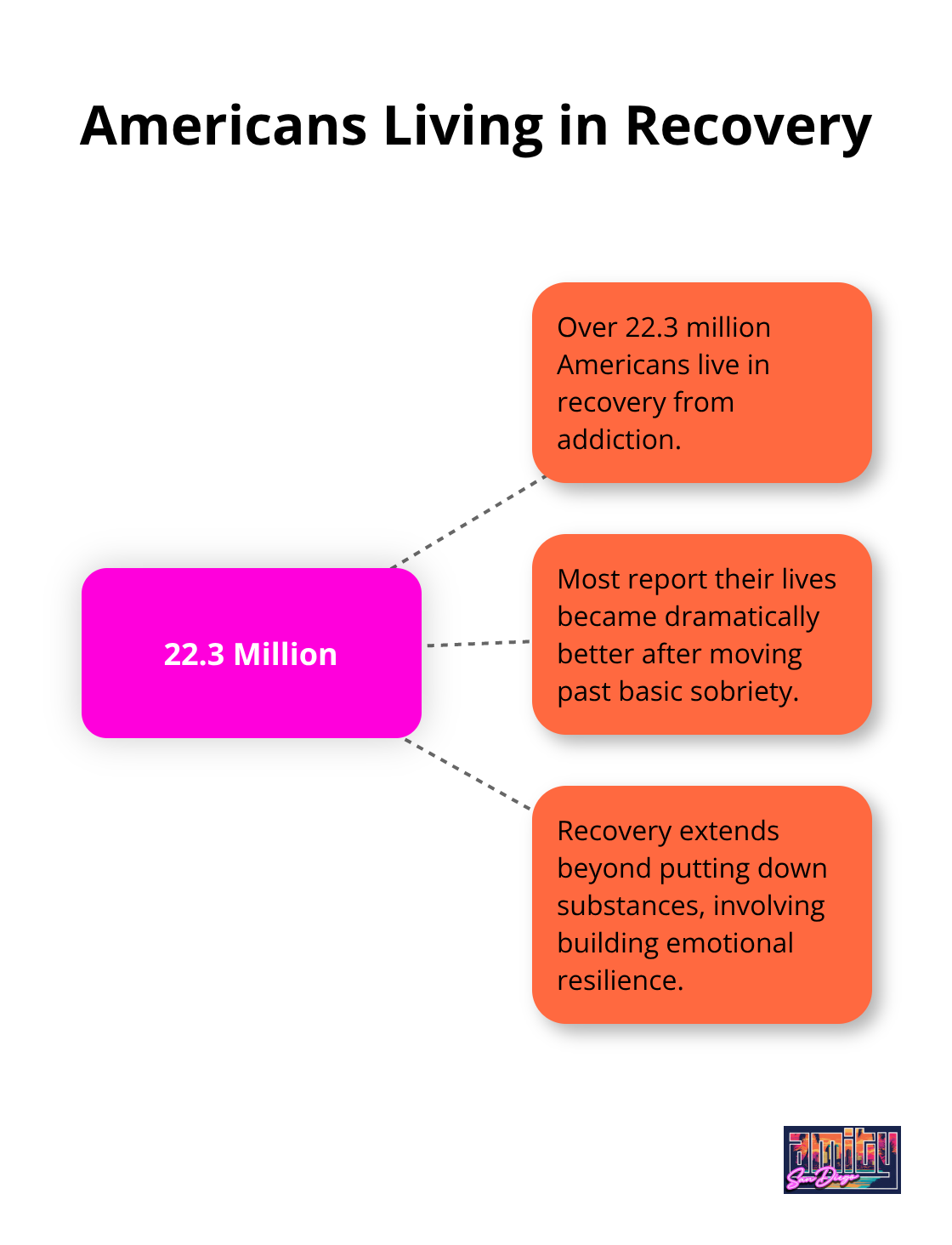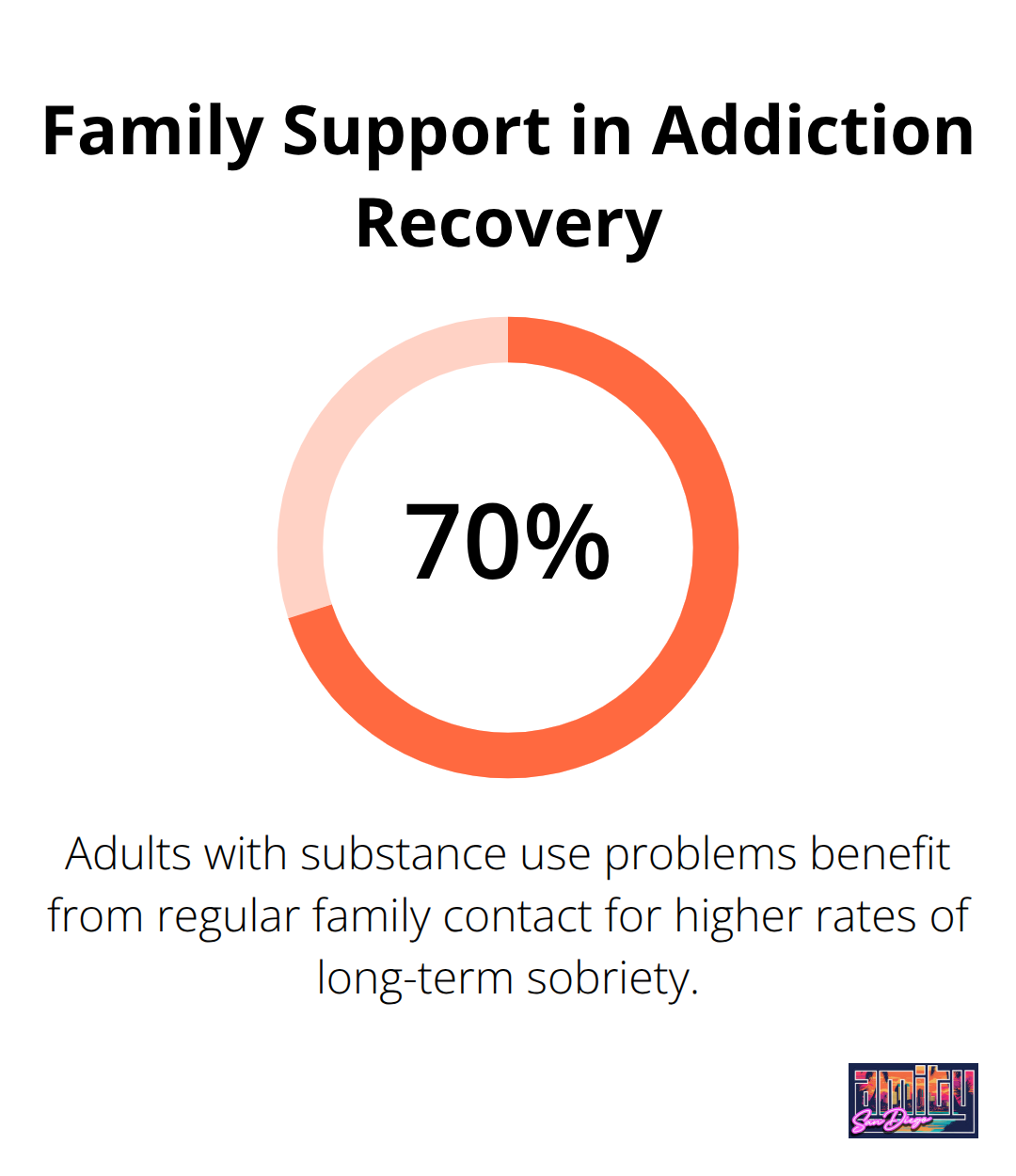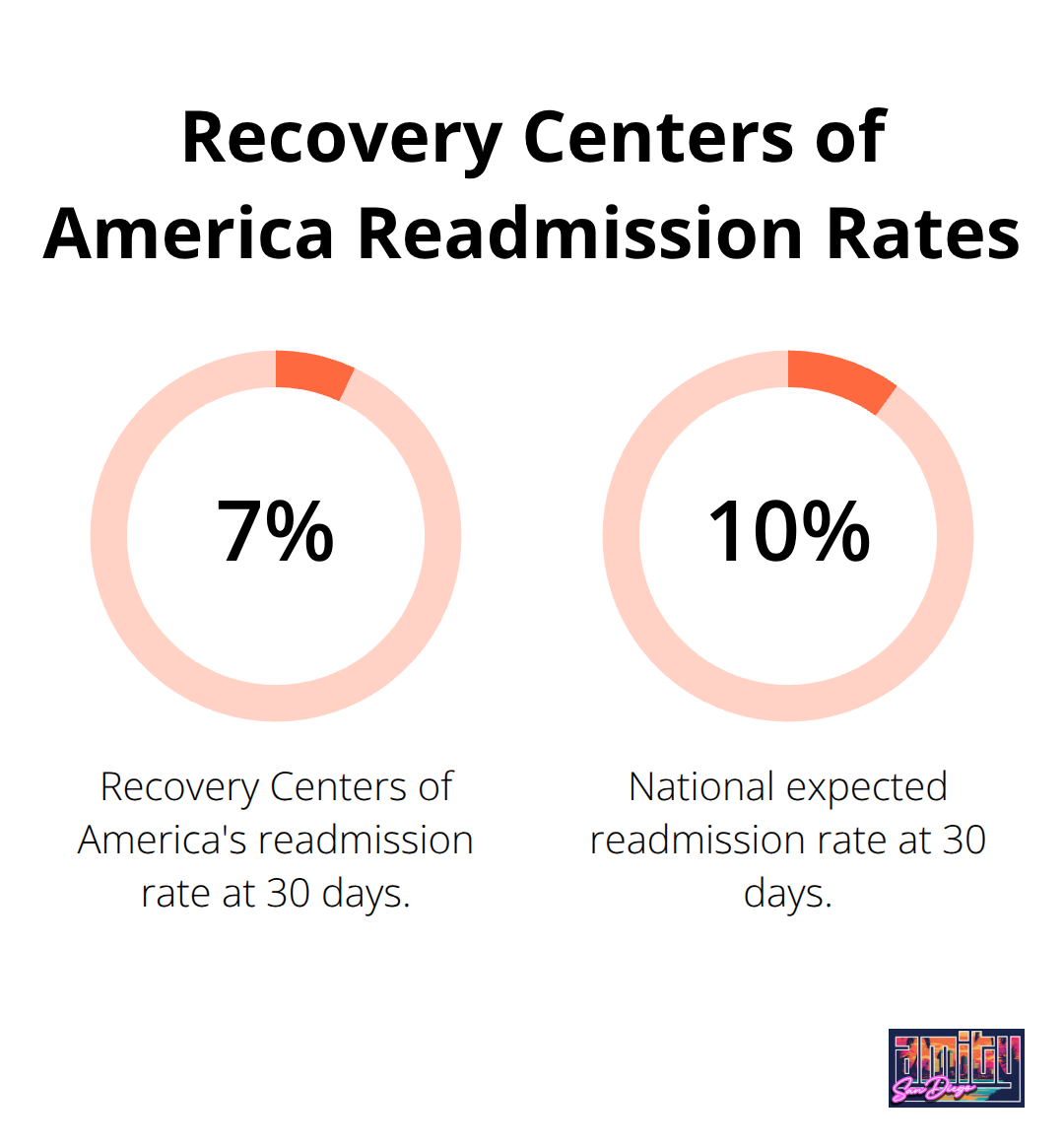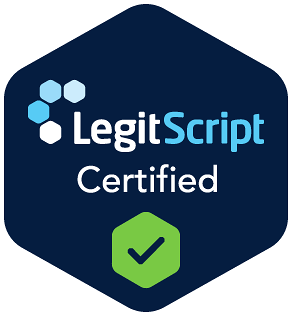Recovery from addiction marks the beginning of an entirely new chapter. Living in recovery from addiction means rebuilding your life from the ground up, creating healthy routines, and rediscovering who you are without substances.
At Amity San Diego, we see people transform their lives every day through comprehensive addiction treatment San Diego programs. The journey ahead involves much more than staying sober-it’s about creating a meaningful, fulfilling life.
What Recovery Really Looks Like
Recovery extends far beyond putting down the bottle or syringe. Real recovery means you build emotional resilience that allows you to handle life’s pressures without numbing yourself. According to Harvard Medical School, over 22.3 million Americans live in recovery, and most report that their lives became dramatically better once they moved past basic sobriety.

Moving Beyond Basic Sobriety
True recovery happens when you develop practical coping skills like identifying your emotional triggers before they spiral. You create structured daily routines that support your mental health. You learn to sit with uncomfortable feelings instead of avoiding them. This transformation requires you to rebuild your relationship with yourself and the world around you.
Building Structure That Actually Works
Successful recovery requires you to replace chaotic patterns with intentional daily habits. Wake up at the same time every day (even weekends). Eat regular meals at consistent times. Schedule specific blocks for exercise, work, and social connection. People in long-term recovery often credit rigid morning routines with preventing relapse during difficult periods.
Your brain needs predictability to heal from the damage addiction caused. Post-Acute Withdrawal Syndrome symptoms like mood swings and concentration problems can last months after you stop substances, but consistent routines help stabilize your nervous system faster.
Developing Real Emotional Tools
Recovery demands that you learn how to process emotions without substances. Cognitive Behavioral Therapy techniques teach you to challenge negative thought patterns before they lead to cravings. Dialectical Behavior Therapy skills help you tolerate distress without acting impulsively. Mindfulness practices reduce anxiety and improve emotional regulation.
Track your moods daily to identify patterns. Practice deep breathing when stress hits. Build a crisis plan for overwhelming moments that includes specific people to call and concrete actions to take. These skills become the foundation for everything else you’ll rebuild in your new life, and professional addiction treatment San Diego programs can provide the structured support needed to develop these essential tools.
Rebuilding Relationships and Social Connections
Repairing Trust Takes Time and Consistent Action
Trust rebuilds through small, consistent actions rather than grand gestures. Show up when you say you will. Answer phone calls promptly. Follow through on commitments, even minor ones like taking out trash or arriving on time. Studies from the Substance Abuse and Mental Health Services Administration show that 7 in 10 adults who ever had a substance use problem benefit from maintaining regular contact with supportive family members for higher rates of long-term sobriety.

Start with low-stakes promises and build credibility slowly. Your family watched you break promises for years – they need concrete evidence that you’ve changed. Write apology letters that focus on specific actions you took, not general statements about being sorry. Take responsibility without making excuses about your addiction causing the behavior.
Finding Supportive Recovery Communities
Alcoholics Anonymous and Narcotics Anonymous meetings happen in every neighborhood, but not all meetings work for everyone. Visit different groups until you find one where people share similar backgrounds or recovery approaches that resonate with you. SMART Recovery meetings focus on practical tools and self-management rather than spiritual principles. Women for Sobriety creates gender-specific support that addresses unique challenges women face in recovery.
People who attend support group meetings regularly during their first year show better recovery outcomes than those who attend sporadically. Exchange phone numbers with people who have solid recovery time and actually use those numbers when cravings hit. Avoid people who constantly talk about using or seem unstable in their own recovery.
Navigating Social Situations Without Substances
Practice saying no to drinks before you need to use the phrase. Have your response ready: “I’m not drinking tonight” works better than lengthy explanations about your recovery. Arrive early to social events when you feel most energetic and leave before your willpower weakens. Always drive yourself so you control when you leave (this gives you complete autonomy over your evening).
Bring a sober friend who understands your situation and can provide support if conversations become difficult. Order a specific non-alcoholic drink immediately upon arrival – club soda with lime looks like a cocktail and gives your hands something to hold. Plan activities that don’t center around drinking like morning coffee meetings, hiking, or fitness classes where alcohol isn’t the main attraction.
These relationship and social skills form the foundation for the next phase of recovery: creating deeper purpose and meaning in your sober life through new interests, service opportunities, and personal achievements. Family therapy can provide additional support in rebuilding trust with loved ones, while comprehensive recovery programs help individuals find balance and live healthier lives. For those seeking professional support, consider addiction treatment San Diego options that specialize in relationship rebuilding.
Creating Purpose and Meaning in Sobriety
Recovery opens doors to opportunities that addiction kept locked away. People in long-term recovery frequently achieve milestones they once thought impossible, including homeownership, career advancement, and meaningful relationships according to the CDC and National Institute on Drug Abuse. The key lies in concrete action rather than waiting for motivation to strike.
Exploring New Interests and Career Opportunities
Start with activities that require zero experience but provide immediate satisfaction. Take a cooking class at your local community college. Join a hiking group through Meetup. Volunteer at an animal shelter for two hours weekly. These low-commitment activities help you identify genuine interests versus things you think you should enjoy.
The plasticity of the human brain contributes to both the development of and recovery from alcohol use disorder. Many people discover talents they never knew they had once their brain chemistry stabilizes.
Consider vocational rehabilitation programs if your addiction interrupted your education or career trajectory. Community colleges offer certificate programs in high-demand fields like healthcare support, skilled trades, and technology that can be completed in 6-18 months.
Finding Purpose Through Service and Mentorship
Sponsor someone in AA or NA once you have one year of sobriety. Volunteer at treatment centers or sober living homes where your experience provides hope to people just starting recovery. Habitat for Humanity needs consistent volunteers who show up reliably. Food banks require people who can commit to regular shifts rather than sporadic help.
Recovery Centers of America achieves strong outcomes with their evidence-based care model, with readmission rates of 7.5% at 30 days, below the national expected rate of 10%. Start small with one volunteer commitment per week and build from there. Avoid leadership roles in your first year (focus on consistent attendance rather than managing others).

Many people find that faith-based approaches provide additional strength and community support during recovery, offering both purpose and connection with others who share similar values. For those seeking comprehensive support, consider exploring addiction treatment San Diego options that align with your recovery goals.
Setting Achievable Goals and Tracking Progress
Write down three specific goals for the next 90 days that you can measure objectively. Save $500 for an emergency fund. Complete a 5K run. Read two books cover to cover. Break each goal into weekly action steps and track your progress daily using a simple notebook or phone app.
Celebrate small wins immediately – treat yourself to a nice dinner after your first month of consistent gym attendance. Share your achievements with your support network rather than keeping them private. People in recovery who set and achieve small goals build confidence that transfers to larger life changes.
Review your goals monthly and adjust them based on what you learn about yourself. The process of goal-setting and achievement rebuilds self-trust that addiction destroyed (this foundation supports every other aspect of your new life).
Final Thoughts
Living in recovery from addiction requires you to accept that this journey never truly ends. The CDC reports that approximately 75% of individuals who experience addiction eventually recover and lead fulfilling lives, but this success depends on how you view recovery as a continuous process rather than a destination you reach and forget about. The challenges you face in recovery – stress management without substances, relationship repair, new routine creation – these difficulties don’t disappear after your first year sober.
Recovery transforms your life in unexpected ways. You sleep better, relationships deepen, and career opportunities emerge that addiction blocked (the Harvard Medical School study shows over 22.3 million Americans live in recovery, proving transformation is possible). People with eight years of recovery still experience moments of vulnerability, but they’ve developed the tools to navigate these situations without relapse.
We at Amity San Diego understand that recovery extends far beyond initial treatment. Our comprehensive programs provide the support needed for long-term success through services that adapt to your needs. Your recovery story continues to unfold every day you choose sobriety, and each challenge you overcome without substances strengthens your foundation for the future.



